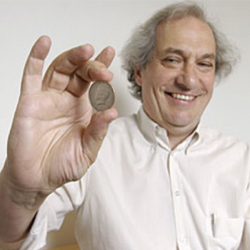
Persi Diaconis
Professor Diaconis received a MacArthur Fellowship in 1979, and again in 1992 after the publication (with D. Bayer) of a paper entitled "Trailing the Dovetail Shuffle to Its Lair", a term coined by magician Charles Jordan in the early 1900s. This established rigorous results on how many times a deck of 52 playing cards must be riffle shuffled before it can be considered "random enough". He established that the deck gradually increases in randomness until seven shuffles, after which the thus-far experienced increase in randomness stops significantly increasing. At least seven shuffles, for reasons made precise in the paper, is what casinos should use.
Among the highlights of his research is his work on the speed of convergence of Markov chains to equilibrium, and his contributions to Bayesian statistics. His pioneering applications of non-commutative Fourier analysis and techniques from algebraic structures have contributed greatly to our understanding both of random walks on finite structure models for group valued data, and of simulations of probabilities on combinatorial structures.
As both a magician and a statistician, Professor Diaconis has debunked much research on extra sensory perception and the paranormal, and has exposed several psychics.